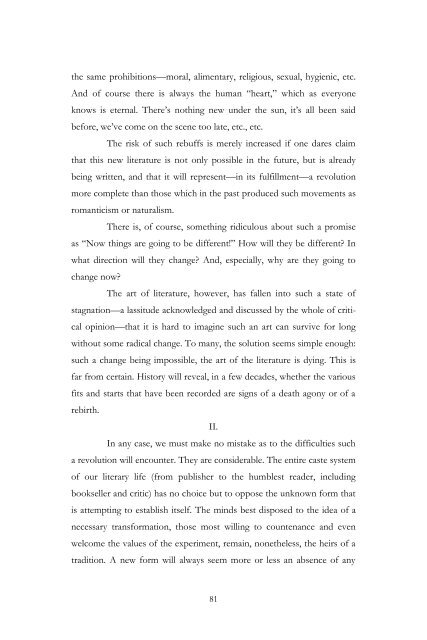CONTACT WITH POETS
vAuBTr
vAuBTr
Create successful ePaper yourself
Turn your PDF publications into a flip-book with our unique Google optimized e-Paper software.
the same prohibitions—moral, alimentary, religious, sexual, hygienic, etc.<br />
And of course there is always the human “heart,” which as everyone<br />
knows is eternal. There’s nothing new under the sun, it’s all been said<br />
before, we’ve come on the scene too late, etc., etc.<br />
The risk of such rebuffs is merely increased if one dares claim<br />
that this new literature is not only possible in the future, but is already<br />
being written, and that it will represent—in its fulfillment—a revolution<br />
more complete than those which in the past produced such movements as<br />
romanticism or naturalism.<br />
There is, of course, something ridiculous about such a promise<br />
as “Now things are going to be different!” How will they be different? In<br />
what direction will they change? And, especially, why are they going to<br />
change now?<br />
The art of literature, however, has fallen into such a state of<br />
stagnation—a lassitude acknowledged and discussed by the whole of critical<br />
opinion—that it is hard to imagine such an art can survive for long<br />
without some radical change. To many, the solution seems simple enough:<br />
such a change being impossible, the art of the literature is dying. This is<br />
far from certain. History will reveal, in a few decades, whether the various<br />
fits and starts that have been recorded are signs of a death agony or of a<br />
rebirth.<br />
II.<br />
In any case, we must make no mistake as to the difficulties such<br />
a revolution will encounter. They are considerable. The entire caste system<br />
of our literary life (from publisher to the humblest reader, including<br />
bookseller and critic) has no choice but to oppose the unknown form that<br />
is attempting to establish itself. The minds best disposed to the idea of a<br />
necessary transformation, those most willing to countenance and even<br />
welcome the values of the experiment, remain, nonetheless, the heirs of a<br />
tradition. A new form will always seem more or less an absence of any<br />
81


